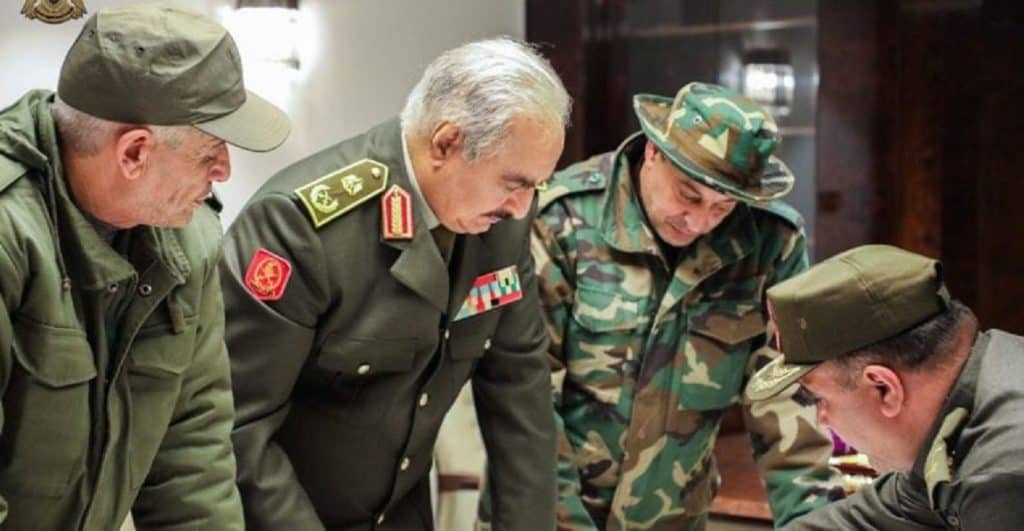By Anton Evstratov
After the defeat of Haftar’s army near Tripoli, Libya faces the threat of foreign intervention and the civil war has the potential to develop into a regional war.

The attack on the capital Tripoli, controlled by the Government of National Accord Fayez Saraj, by Marshal Haftar in April 2019, has been going on de jure since 2014, but it was in 2019 that the moment of truth arrived. At that time, Saraj did not have a sufficient number of armed forces to adequately repel the forces led by the Marshal of the Libyan National Army.
In addition, there were clashes among the supporters of the PNC, including armed ones, and a certain number of tribes, who supported it, withdrew to the west of the country. Not surprisingly, many experts and politicians at the time did not foresee the survival of the Saraj cabinet for more than a few months.
Interestingly, NTC supporters rely on Haftar’s lack of legitimacy vis-a-vis the UN-recognized government of national accord, but forget that formally the marshal acts on behalf of the Libyan House of Representatives, seated in Tobruk and led by President Agila Saleh. The latter was elected in 2014 and recognized not only by the UN, but also by the League of Arab States and the Organization for Islamic Cooperation.
However, PNC members had trump cards up their sleeves, which ultimately changed the situation, both in Libya and in the region, from the eastern Mediterranean to the North African coast. We are talking about Turkey, which has become Saraj’s loyal and reliable ally. At first the Libyan side entered into an agreement with Ankara which allows the Turks to carry out geological explorations with subsequent drilling in Libyan territorial waters.
Then began the interaction of the PNS with Ankara and along the military line, first expressed in the presence of Turkish military equipment and advisers in Libya, and then in the transfer there of the pro-Turkish militia forces of the “Free Syrian Army” under the command of Turkish officers.
In a sense, carte blanche for such a policy was given to the national consensus government by its opponent Haftar, who did not hesitate to receive weapons from abroad (in particular, Russian Pantsir air defense systems from the UAE and Chinese drones , not even mentioning small arms) and also the use of foreign mercenaries (for example, the marshal was accused of having the support of fighters by the Russian PMC Wagner, which was also indirectly confirmed by Russian President Vladimir Putin , which, however, has disavowed the mercenaries of the private company).
As a result, at first, the Libyan National Army’s offensive on Tripoli stalled and since the beginning of 2020 the troops loyal to the PNS launched a counter-offensive, which led to the unblocking of Tripoli and the occupation of a series of other strategically important settlements, up to Tarhuna. Now the port of Sirte is under threat of occupation by Saraj troops and pro-Turkish forces.
Turkey is increasingly dragging Egypt, whose troops had previously concentrated on the Libyan border, into the conflict. The Egyptian parliament recently authorized the participation of its armed forces in the Libyan confrontation, alongside Khalifa Haftar. The PNS has already registered several times the participation of Egyptian aircraft in the air operations of the Libyan National Army.
Cairo’s interest in supporting the Marshal is understandable and is based on three points:
1) Fight against political Islam. The secular government of Abdel Fattah al-Sisi, which came to power in Egypt after the overthrow of the clerical regime of Morsi, fears the strengthening of religious elements, both within the country and on its borders. Sisi sees a particular danger in the international Islamist network “Muslim Brothers”, represented by the ousted Mursi, who is now increasingly actively raising his head in Libya. The “Muslim Brotherhood”, together with the Salafist groups, control the Government of National Accord. They are supported by the Islamist government of Recep Tayyip Erdogan in Turkey. This logically provokes the opposition of Egypt.
2) Anti-terrorism agenda. Khalifa Haftar is building his policy on fighting terrorism and terrorists. Cairo considers most groups loyal to the PNS to be terrorists. Consequently, Sissi and Egypt can only support the marshal in this matter.
3) Fight against the strengthening of Turkish influence in North Africa. Turkey, with its agreement with the PNS, as well as its military presence in Libya, on the one hand, distances Egypt from oil production in the Mediterranean Sea, and on the other creates a dangerous neighborhood for Egypt, with Turkish troops and military bases and a pro-Turkish government.
Haftar is considered to be the force capable of preventing it or, at least, of constituting a buffer between the Egyptian borders and the territory controlled by the PNS.
Obviously it was in Egypt that Abdel Fattah al-Sisi, Khalifa Haftara and the president of the Libyan House of Representatives, Agila Saleh, signed the Cairo Declaration, on the one hand calling for a peaceful solution for Libya, but on the other, of course on the basis of Egyptian political-military interests in the region, because there were no representatives of the opposite side – PNS at the negotiations.
It should be noted that a serious advantage that has appeared for Egypt in recent days is the support from Saudi Arabia, as the parties agreed during the visit to Cairo by the foreign minister of Ksa Faisal bin Farhad al-Saud. It is known that Riyadh has long been a major financial partner, creditor and patron of Egypt, and its finances will come in handy for Sisi in his confrontation with Turkey.
However, Egypt is by no means the only party increasingly involved in the Libyan civil confrontation. As before, Russia appears to be an interested party who, while formally negotiating with both sides of the conflict, is truly loyal to Haftar. In addition to the presence of Russian PMC fighters in the ranks of the marshal’s army, this is confirmed by the fact of printing banknotes in the Russian Federation for the territories controlled by the marshal’s troops. An indirect confirmation of the seriousness of Russia’s intentions and its reluctance to allow the SNP to take Sirte is the recent appearance in Libya of some unidentified, possibly Russian, aircraft which operated with extreme success against Saraj’s advancing parties. However, according to other sources, it is the aforementioned Egyptian aviation.
Another major player, the UAE, is also stepping up its support for Haftar, with intermediary companies smuggling arms from the Emirates to Libya under UN sanctions. Interestingly, these companies, in addition to the UAE, were registered in the British Virgin Islands and Kazakhstan. However, this is unlikely to prevent the Emirates from continuing to actively support its ally.
Also important is Haftar’s support from France – mainly for reasons similar to those of Egypt – the fight against political Islam, the opposition to Turkey and the opposition to terrorism, from which the Third Republic has suffered severely. However, at the moment, prostration reigns in the French political establishment, associated with Haftar’s defeats and the inability of French diplomacy to restore order to Libya.
Turkey, in turn, may at the moment feel like a winning team, but, of course, this victory cannot be all-encompassing, because on the one hand the Turkish influence in the region is already balanced by the Egyptian one, and on the other, it seems, the agreements between Ankara and Moscow, concluded on Syria, are in force in Libya. Furthermore, in its aspirations for oil and gas in the Mediterranean, Turkey is limited by the decisive actions of Greece, which more than once has declared itself ready to protect its territorial waters from Turkish invasions, even with military methods.
It should be noted that Qatar is on the side of PNC and Ankara, opposing Saudi Arabia and Egypt, but acting much less actively and appearing more in the role of a situational satellite than a large and independent center of gravity.
Therefore, the Libyan confrontation is not only growing with new and more emerging participants – it is becoming more principle-based, harsh and less and less solvable – at least in the short term. In fact, all the peace initiatives on Libya (Declarations of Berlin and Cairo) have proved unsustainable and after them military operations are conducted with renewed vigor and on a large scale. Each side has already shown decisiveness, both at the level of statements and at the level of concrete actions, which increases the risk of the conflict escalating and shifting to a more global level.
The importance of Libya in an economic sense, as the richest oil country in Africa in this context, is also difficult to overestimate. On the other hand, there are serious obstacles to the transition of the confrontation to a broader stage: the Russian-Turkish agreements, the NATO membership of Greece, Turkey and France, the American influence on Cairo and Riyadh and the desire of the parties to preserve the remaining oil infrastructure in Libya.
In this regard, one cannot fail to note the need for the main actors of the conflict to be extremely attentive, which, in a sense, can prevent the risk of escalation and maintain hope for adequate mutually beneficial settlement.
Author: Anton Evstratov (Russian historian, publicist and journalist living in Armenia, lecturer at the Department of World History and Foreign Regional Studies at the Russian-Armenian University in Yerevan).
(The opinions expressed in this article are solely those of the authors and do not necessarily reflect the views of World Geostrategic Insights)







